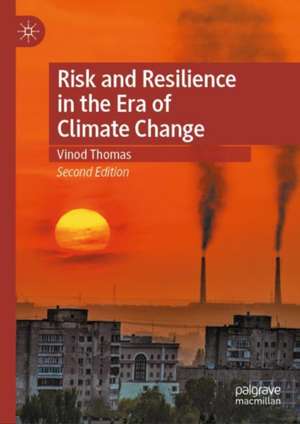Risk and Resilience in the Era of Climate Change
Autor Vinod Thomasen Limba Engleză Hardback – 9 sep 2024
The first is that accounting for the root causes, and not just their symptoms, is essential to slowing these events. It is therefore vital to link carbon emissions from human activity to the sharp rise in climate disasters globally. The second is that growth economics and policy must factor in the failure of governments and businesses to tackle spillover harm from economic activities, as seen strikingly with global warming AND BIODIVERSITY LOSS. With climate risks rising, this calls for a fundamental revision of the framing of growth in the teaching and practice of business and economics. And third, prevention must become a far bigger part of resilience building, with preparedness to avert or handle tougher eventualities built into interventions. Emphasis on prevention deems disaster recovery as not just returning to how things were but building back better.
| Toate formatele și edițiile | Preț | Express |
|---|---|---|
| Hardback (2) | 198.92 lei 22-36 zile | +18.93 lei 5-11 zile |
| Springer Nature Singapore – 15 mar 2023 | 198.92 lei 22-36 zile | +18.93 lei 5-11 zile |
| Springer Nature Singapore – 9 sep 2024 | 208.04 lei 22-36 zile |
Preț: 208.04 lei
Nou
Puncte Express: 312
Preț estimativ în valută:
39.81€ • 41.31$ • 33.28£
39.81€ • 41.31$ • 33.28£
Carte disponibilă
Livrare economică 24 februarie-10 martie
Preluare comenzi: 021 569.72.76
Specificații
ISBN-13: 9789819727681
ISBN-10: 9819727685
Pagini: 200
Ilustrații: Approx. 200 p.
Dimensiuni: 148 x 210 mm
Greutate: 0.52 kg
Ediția:Second Edition 2024
Editura: Springer Nature Singapore
Colecția Palgrave Macmillan
Locul publicării:Singapore, Singapore
ISBN-10: 9819727685
Pagini: 200
Ilustrații: Approx. 200 p.
Dimensiuni: 148 x 210 mm
Greutate: 0.52 kg
Ediția:Second Edition 2024
Editura: Springer Nature Singapore
Colecția Palgrave Macmillan
Locul publicării:Singapore, Singapore
Cuprins
Chapter 1 Opening Summary: Risk, Resilience and Climate Change.- Chapter 2 Climate, Health, and Geopolitical Crises.- Chapter 3 Understanding Risk and Uncertainty.- Chapter 4 Resilience Combining Mitigation and Adaptation.- Chapter 5 New Highs in Risk and Resilience.- Chapter 6 Intractability of Climate Change.- Chapter 7 Growth versus Climate: A Persistently False Dichotomy.- Chapter 8 Climate Mitigation and Adaptation in Policymaking.- Chapter 9 The Necessity of Transformative Change.
Notă biografică
Vinod Thomas, Associate Senior Fellow, ISEAS, Singapore and Distinguished Fellow, AIM, Manila, and previously Visiting Professor at Lee Kuan Yew School of Public Policy, National University of Singapore, was Senior Vice President, Independent Evaluation, at the World Bank, and Director General of Independent Evaluation at the Asian Development Bank. He has authored 17 books, including Climate Change and Natural Disasters (2017).
Textul de pe ultima copertă
This book presents essential insights on the interaction between rising risks and raising the bar for resilience during the climate crisis. Its timeliness lies in applying important findings on risk and resilience to runaway climate change. When risk and resilience are brought together in the context of climate catastrophes, three key messages emerge.
The first is that accounting for the root causes, and not just their symptoms, is essential to slowing these events. It is therefore vital to link carbon emissions from human activity to the sharp rise in climate disasters globally. The second is that growth economics and policy must factor in the failure of governments and businesses to tackle spillover harm from economic activities, as seen strikingly with global warming AND BIODIVERSITY LOSS. With climate risks rising, this calls for a fundamental revision of the framing of growth in the teaching and practice of business and economics. And third, prevention must become a far bigger part of resilience building, with preparedness to avert or handle tougher eventualities built into interventions. Emphasis on prevention deems disaster recovery as not just returning to how things were but building back better.
The first is that accounting for the root causes, and not just their symptoms, is essential to slowing these events. It is therefore vital to link carbon emissions from human activity to the sharp rise in climate disasters globally. The second is that growth economics and policy must factor in the failure of governments and businesses to tackle spillover harm from economic activities, as seen strikingly with global warming AND BIODIVERSITY LOSS. With climate risks rising, this calls for a fundamental revision of the framing of growth in the teaching and practice of business and economics. And third, prevention must become a far bigger part of resilience building, with preparedness to avert or handle tougher eventualities built into interventions. Emphasis on prevention deems disaster recovery as not just returning to how things were but building back better.
Caracteristici
Provides a clear understanding of rising risks of Climate Change Elaborates on priorities for climate mitigation and adaptation Argues that it is imperative to raise the bar on building resilience
